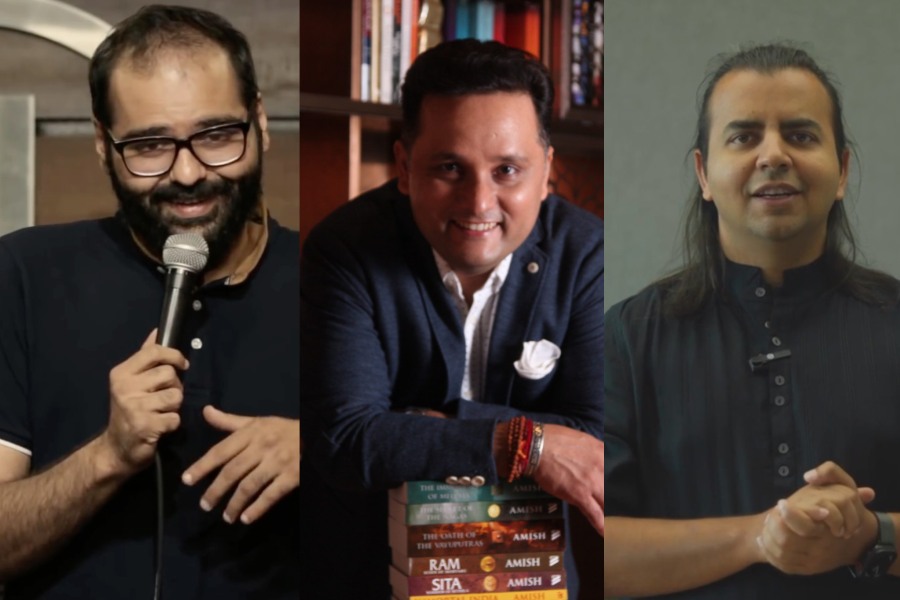History taught us to look wrongly at Ram Janmabhoomi; it is not a Hindu-Muslim but an Indian-foreigner issue, said bestselling author Amish Tripathi at the launch of his new book, The Chola Tigers in Bengaluru.
In a freewheeling chat with Manish Sabharwal, Chairman and Co-Founder of Teamlease Services, at the launch event organised at Bangalore International Centre on September 1, Tripathi recalled that while he was interviewing "one of the greatest living archeologists of India" and former Regional Director of Archeological Survey of India, K K Mohammad, for a documentary that he was working on, he came across this point of view.
"Mohammed saab told me, 'Babar was an Uzbek, I'm an Indian Muslim, what do I have to do with him?' And he said that we are wrongly looking at the Ram Janmabhoomi temple as a Hindu-Muslim issue. It's an Indian-foreigner issue. A foreigner attacked one of our worship places. That's the way to see it," said Tripathi.
History, said Tripathi, is influenced by observer bias and cultural perspective.
As an example, he pointed out how British colonial rule is not called the Christian invasion, but Turkey colonial rule is called Islamic invasion.
"Have you guys ever thought about this? It's very mischievous if you actually think about it. It's almost like what was an Indian-foreigner issue has been converted very mischievously into a Hindu-Muslim issue. I can understand why the British Raj wanted to do it. Why did our own historians continue with this post 1947?" asked Tripathi.
To reiterate the idea -- that Hindus and Indian Muslims are not enemies -- Tripathi said he made sure that his characters avenging Lord Somnath temple raid by Mahmud of Ghazni were both Hindus and Muslims in The Chola Tigers, which is set in 1025 CE.
"So, in The Chola Tigers, warriors from across India, led by Rajendra Chola, go to Ghazni. There's a woman in the team too. There are Hindus and Muslims who go and fight the good fight for India," added Tripathi.
Even the dialogues in his book reinforce this idea, he added.
"There's a line I use in my book. It's an adaptation of a line that comes from a saying in my native language. The Kauravas may be 100, the Pandavas may be five. But if an outsider comes, we're 105. That's the attitude we must have," said Tripathi.
The bestselling author of Shiva trilogy and Ramchandra series said that despite writing on potentially controversial topics, like religion and identity, he avoids controversy by approaching subjects with respect and a genuine admiration for Indian culture.
"You don't need controversy for sales. I am evidence for that. I think the credit goes to the way we Indians are. We intuitively understand different truths. I don't think Indians will have a problem with a different interpretation, if you do it with respect," said Tripathi.
His books, he said, are built around facts. The Chola Tigers came about because he had some questions on the way the history of the last 1,300 years has been presented to us.
"The first obvious thing is the excessive focus on Delhi. It's almost like anything notable in the last 1,300 years happened between Khyber Pass and Agra," he said.
Having spent his childhood in Tamil Nadu and Odisha, Tripathi said he knew this was not true.
"So, we need to cover those non-Delhi parts of our history as well. That's what I'm trying to do in this book," added the author.
Tripathi said he made Rajendra Chola the central character in The Chola Tigers simply because "we need to know more about the Cholas".
"They are fantastic, among the greatest achievers of the Indian dynasties.
I learned of them because I studied in Tamil Nadu in the 1980s. I read the English translation of 'Ponniyin Selvan'. I found their stories too fascinating," said the author.
Tripathi said the more he read about them, the more he realised that both Rajendra Chola and his dad -- around whom the story revolves in 'Ponniyin Selvan' -- were intensely devoted to Lord Shiva.
"If a barbarian comes and destroys one of Lord Shiva's greatest temples, I think Rajendra Chola would have responded. And this would have been his response," said Tripathi.
Except for the headline, this story has not been edited by The Telegraph Online staff and has been published from a syndicated feed.












